Office of Equity & Inclusion at Montgomery college Presents: Critical Race Theory Forum – Reframing the Narrative
A Montgomery College Student Perspective of the Forum and Opinion on its Application in the Education System
On October 28th, 2021, Montgomery College’s Office of Equity, and Inclusion, in partnership with Montgomery County’s Office of the County Executive and The Universities at Shady Grove, hosted a hybrid forum called “Critical Race Theory – Reframing the Narrative.” The forum happened in person at the Montgomery College Cultural Arts Center in Silver Spring, MD, and it was also available for students, faculty, staff, and community guests in a LIVE format.
Recently, many of the population faced the CRT subject for the first time. The media has been bombarding the public with information, and politicized opinions, particularly its premature attempt to ban it from education. As students, we ask, why? All the misconceptions feel almost like a driving force leading us to fear Critical Race Theory. It is possible to smell it in the air, but we do not even know why we should be afraid of it. Aware of this, the forum intended to answer all the questions that many of us may have and examine what critical race theory (CRT) is—and what it is not.
In the forum’s auditorium, it was possible to read the room and observe the attentive eyes of the audience present there. Jeanette Rojas, Montgomery College Office of Equity and Inclusion Program Manager, introduced Rico Newman, an elder of the Choptico band of Piscataway Canoy Indians indigenous to Maryland. Mr. Newman graced the forum with a land acknowledgment, saying, “The land upon which numerous campuses comprising Montgomery College are built … [are] in the homeland of the Piscataway Canoy people.” Mr. Newman’s words set the room atmosphere to receive the speech of Mrs. Sharon R. Wilder, Chief Equity and Inclusion Officer at Montgomery College. She introduced the basic tenants of Critical Race Theory, explaining that CRT emerged from a framework in legal analysis over 40 years ago; it is an academy concept created by legal scholars.
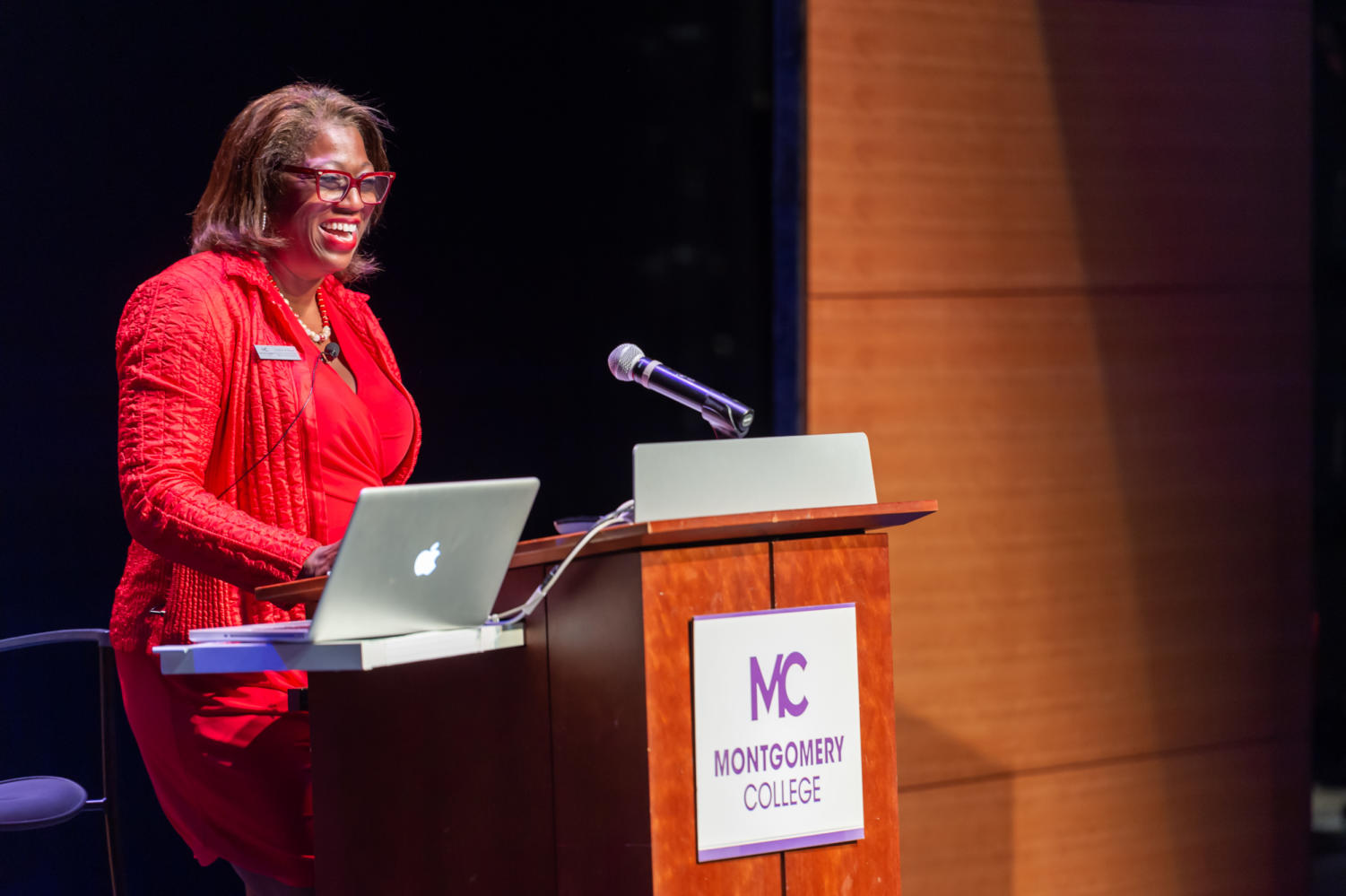
The forum’s program continued with Dr. Charlene Dukes, Montgomery College’s interim
President, arguing how education is an essential step in the healing process of racism roots. Dr. Dukes introduced the audience to Mon
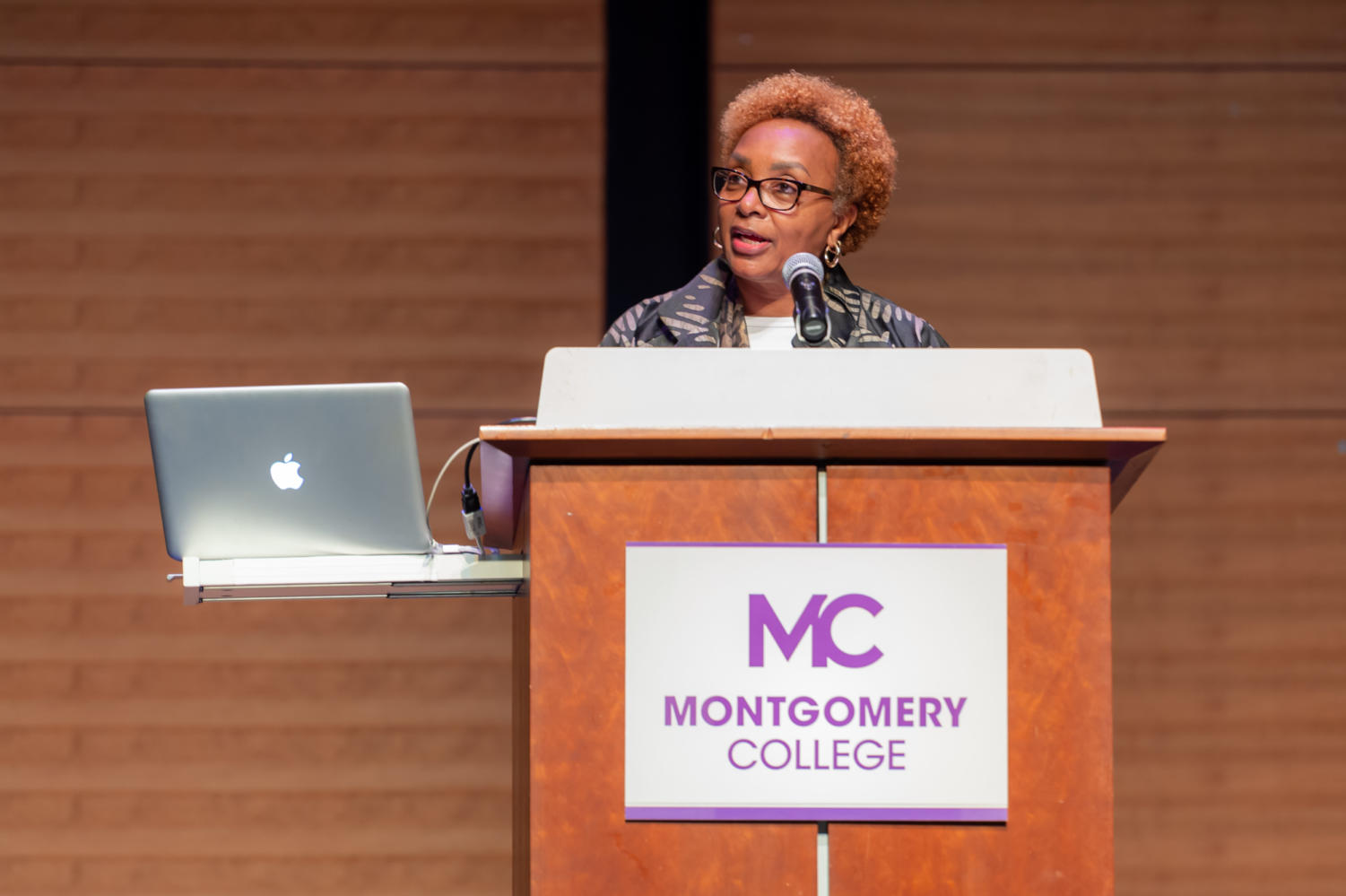
tgomery County Executive Marc Elrich. It was groundbreaking to watch an elder white man dismantle his early upbringing, he says, “[I grew up believing] …some of us are human, some of us are not, some of us are capable, some of us are not. That is the poison that slavery injected into the American bloodstream, and it is a poison we have never been able to treat. We will not talk about it. We will not own up to what happened and what is happening, and the consequences of human slavery. Not in the past. Not in the present.” In this courageous speech, Elrich’s words just left it clear how urgent the need to change the narrative is. To own up to the past in order to heal the present.
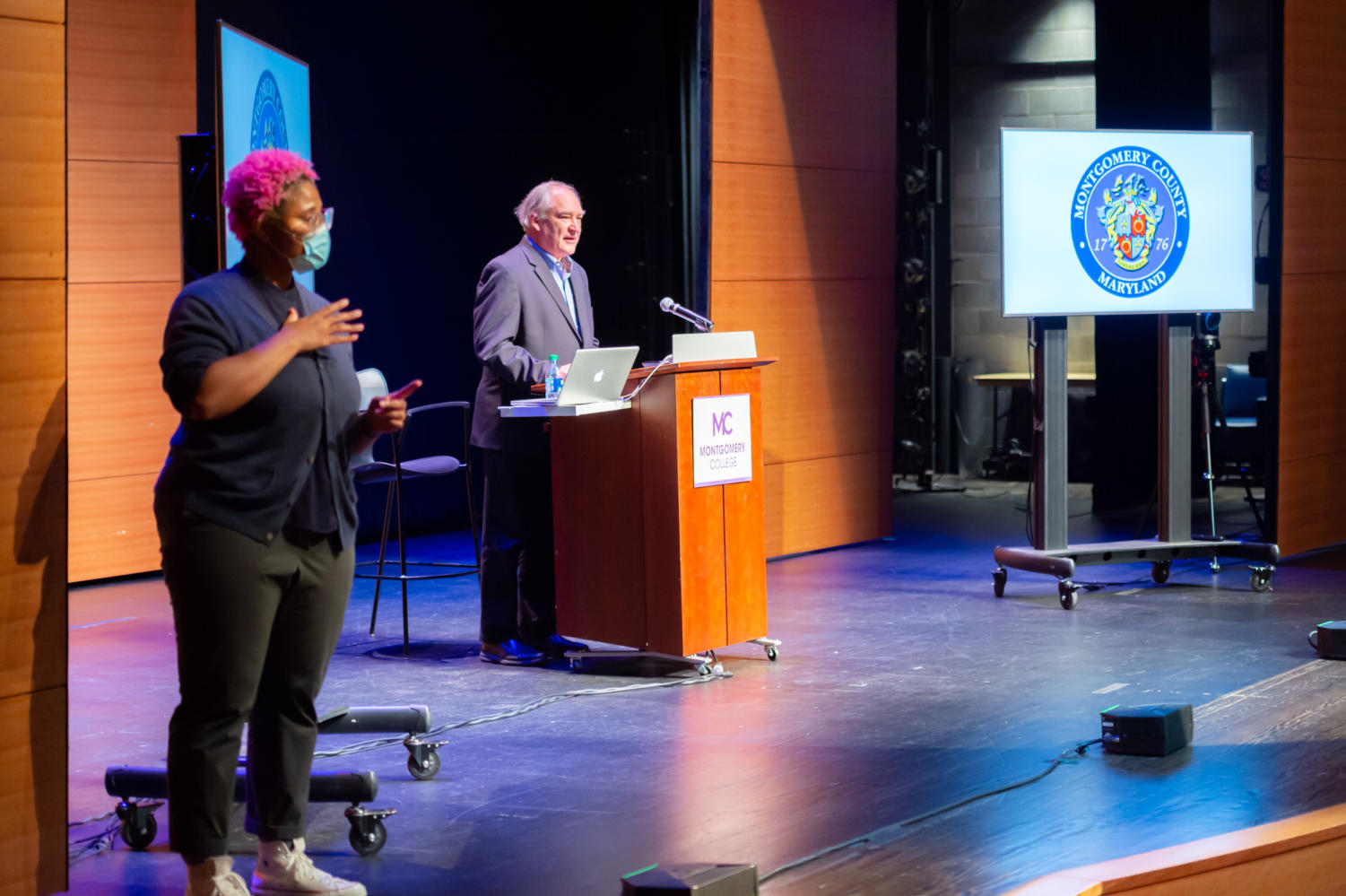
Dr. Anne Khademian, Executive Director of the Universities of Shady Grove, followed the discussion, remembering that it is crucial to refrain and reclaim the narrative. We learned that racial injustice is a product of individual bias and prejudice and alerts us about what is embedded in our society.
The unforgettable and breathtaking thoughts of the afternoon were made by the keynote speaker Dr. Traci Dennis, a Professorial Lecturer from the School of Education at American University. Dr. Dennis overturned pervasive misconceptions about CRT with only one argument, “[CRT] it’s not a curriculum, it does not divide groups by oppressed and oppressive groups. It actually looks at policies and practices, not at people. So, individuals are not interrogated, systems, histories, and structures that are interrogated.” She continues, “Critical Race Theory is a framework that focuses on confronting and challenging systemic racism, its changing beliefs and mindsets. It focuses on validating and affirming all voices and lived experiences.” Concluding that CRT allows marginalized people to articulate their experiences and have their voices heard by bringing to light causes of social injustice in their own lives.
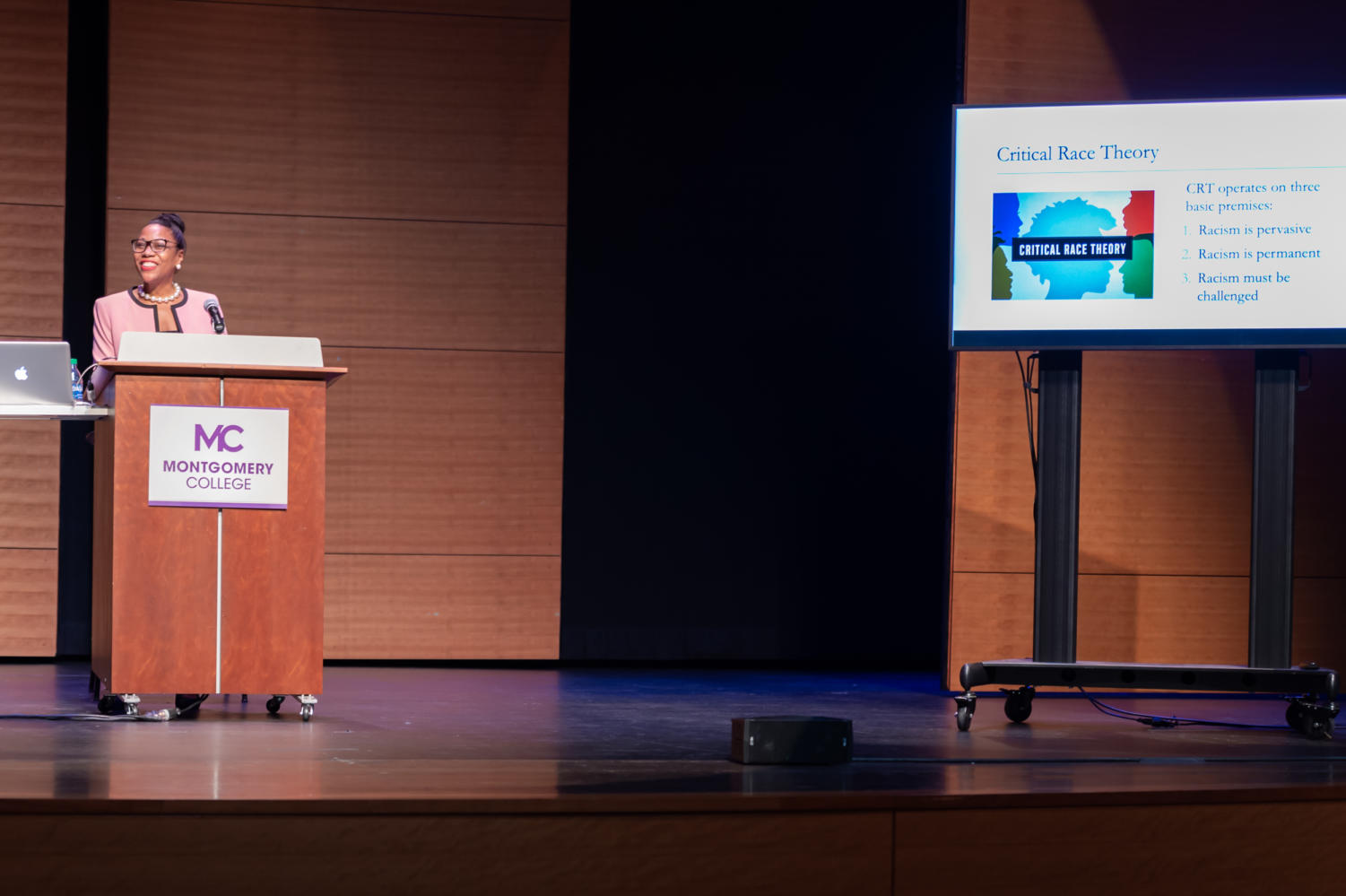
After the astonishing keynote speaker session, the audience could participate in eight online breakout rooms to discuss and brainstorm how to reframe CRT in the areas described: Education with Dr. Glenda Hernandez and Dr. Ebony Terrell, Sociology/Criminal Justice with Dr. Katya Salmi and Ginger Robinson, Psychology/Sociology with Dr. Andraé L. Brown and Dr. Emerald Jones, Science with Dr. Vedham Karpakakunjaram and Dr. Carolyn P. Schick, Community/Healing – UMBC – The Choice Program/Shriver Center
with Eric Ford and Kelly Quinn, History with Dr. Sylvea Hollis and Karl Smith,
Government with Jeanette Rojas, Jackie Peng and Jim Stowe, and English with Dr. Mary
Robinson and Dr. Shayla Atkins.
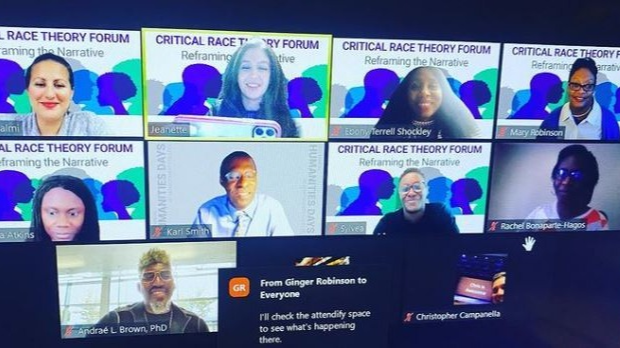
Patrick Ibanez, a Montgomery College student, was a scribe volunteer in the Community/
Healing breakout room. Ibanez shares, “I learned that it is important to give other people space while being available for those whom you want to help. As a person who has been helped, I know that I needed the time and space to develop at my own pace, but I also needed a figure who would be emotionally or physically available whenever I needed guidance. As the second-oldest brother in my family, it is my responsibility to be there for my three younger sisters, and I will use this information to help them develop and heal in any way I can.” The group noted that the framework of the system should embrace critical race theory to change the youth legal system in Maryland.
As a Montgomery College student and scribe volunteer in the Education breakout room with Dr. Glenda Hernandez and Dr. Ebony Terrell, I could testify that the conversation was incredibly engaging. It quickly became a deep discussion about worldviews and reactions to the previous CRT speeches between fellow students, faculty, and the community. It did not take much in the conversation to realize that we all had a unanimous desire to learn more. We are not afraid. We are thirsty for knowledge. At no moment, as a proud Latina, did I feel threatened or accused by any argument and thoughts of critical race theory. On the contrary, I had a heart even more filled with compassion and longing for justice.
The closing remarks highlighted Tiffany Ward, Chief Equity Officer at Montgomery County Government, on what we discovered about Critical Race Theory and the reports from the breakout room sessions. It was not a surprise to learn that the whole community was eager to reframe the narrative and introduce critical race theory into education. By hearing this, what I also learned is that there is still hope in humanity.
Note: Originally this article was posted in the “Equity and Inclusion Office – Fall Newsletter 2021” which is distributed to Montgomery College employees. I work for the Equity and Inclusion Office as a student worker therefore I was invited by Sharon Wilder to write this article with my perspective and thoughts about the CRT Forum as a Montgomery College student. I asked for permission from the OEI office to share this article with The Advocate Newspaper so Montgomery College students could have access to this content.
Note 2: Although this article has reports of the event, it intends to share a personal opinion and perspective of the CRT Forum and does not necessarily represent the Advocate or its staff views.


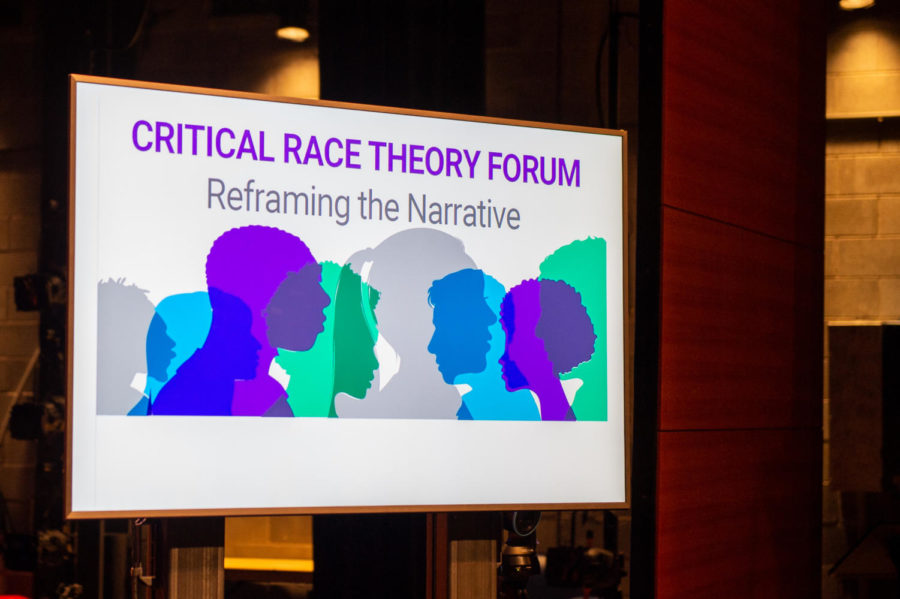
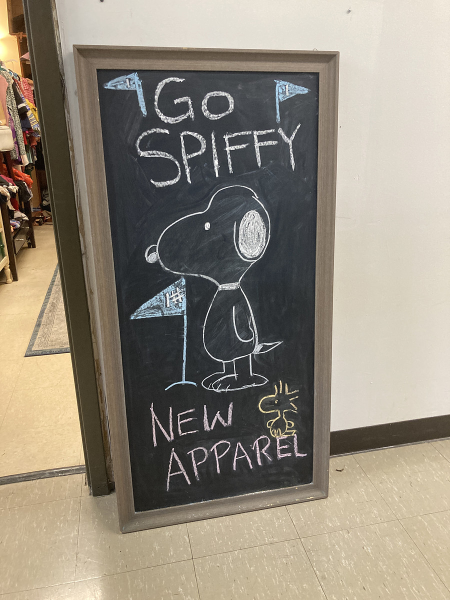
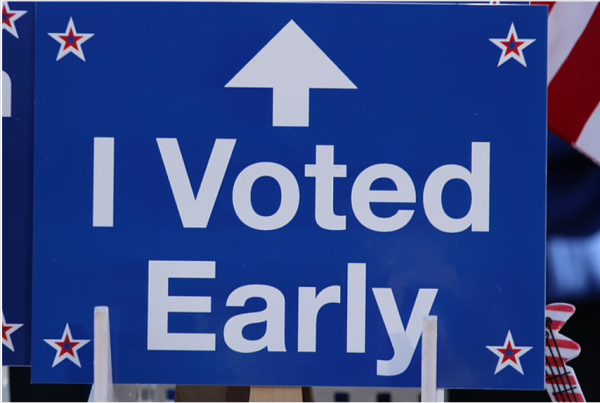
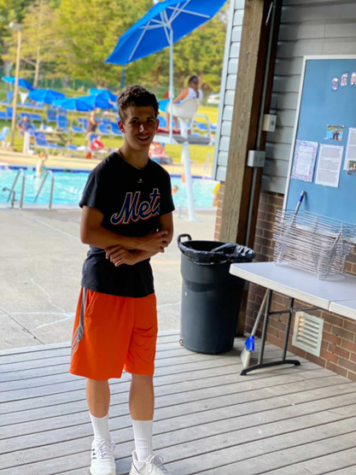
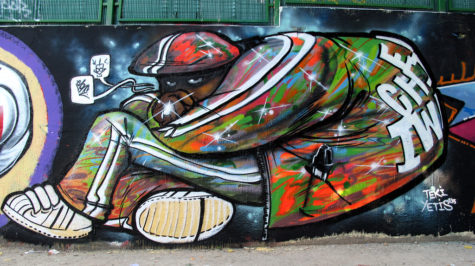
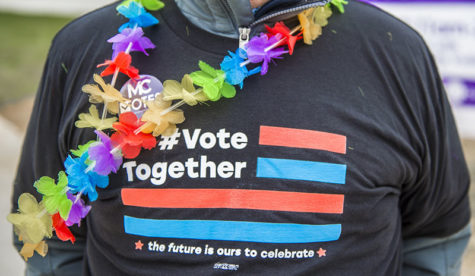
[email protected] • Apr 20, 2022 at 11:19 am
Rarefied atmosphere of intellectual information promulgation.